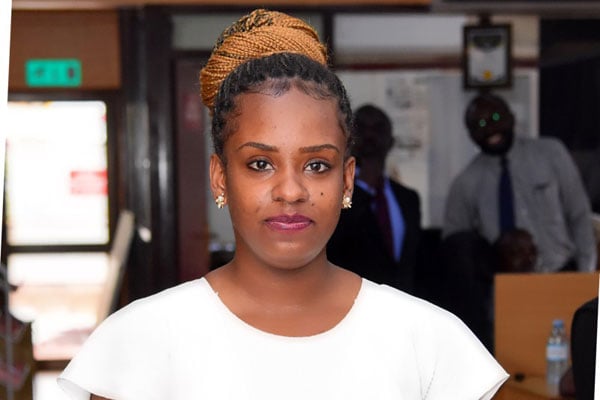Prime
Anti-gay law battle now goes to Supreme Court

Lawyers representing the petitioners ahead of the Constitutional Court ruling on April 3, 2024. PHOTO/REUTERS
What you need to know:
- The aggrieved appellants have raised 17 grounds of appeal against the ruling of the Constitutional Court.
The controversy surrounding the Anti-Homosexuality Act, 2023, seems not to be over as 22 aggrieved gay activists have petitioned the highest appeal court in the land, the Supreme Court.
In their notice seen by this publication, the aggrieved appellants have raised 17 grounds of appeal against the ruling of the Constitutional Court that they want the Supreme Court to resolve.
“Take notice that the above-named petitioners, being dissatisfied with part of the decision of the Honourable Justices Richard Buteera DCJ; and Geoffrey Kiryabwire, Muzamiru Mutangula Kibeedi, Monica Kalyegira Mugenyi and Christopher Gashirabake) given at the Constitutional Court of Uganda sitting at Kampala on the 3rd day of April 2024, intend to appeal to the Supreme Court of Uganda at Kampala, against part of the decision…” reads in part the appeal notice filed at the weekend.
The appellants are MP Fox Odoi Oywelowo, Frank Mugisha, Pepe Onziema, Jackline Kemigisha, Andrew Mwenda, Linda Mutesi, Kintu Nyago, Jane Nasiimwa, Prof Sylvia Tamale, Dr Busingye Kabumba and Solome Nakaweesi Kimbugwe.
Others are; Kasha Jacqueline Nabagesera, Richard Smith Lusimbo, Eric Ndaula, William Apako, Human Rights Awareness & Promotion Forum (HRAPF), Robert Rutaro, Musiime Alex Martin, Mutebi Edward, Nabuyanda John Solomon, Lets Walk Uganda Ltd, and Bishop James Lubega Banda.
But the appellants in their notice of appeal filed electronically are opposed to the holding that the Anti-Homosexuality Act, 2023 was not passed in violation of Article 92 of the Constitution, that the Private Member’s Bill introducing the Anti-Homosexuality Act, 2023 did not violate Article 93(a)(a)(2) of the Constitution, and that there was meaningful and adequate participation of the public during the enactment.
Key issues
Further, they are opposed to the holding that the conduct of the Speaker of Parliament while enacting the Anti-Homosexuality Act, 2023, was not inconsistent with, and in violation of Articles 2(1) and (2), 89(1) and (2) of the Constitution.
Also in their notice of appeal, the appellants rap the justices of the Constitution Court for handling matters that had not been canvassed by the parties, thereby arriving at a wrong decision, failing to properly evaluate the evidence on the court record, relying on inadmissible evidence, and relying on hearsay evidence on recruitment of children into homosexuality.
On April 3, a panel of five justices led by Deputy Chief Justice Richard Buteera, in a unanimous decision, largely upheld the anti-homosexuality law for being in line with the values and the constitution of the land.
Among the untouched parts of the law is the provision on aggravated homosexuality punishable by death by hanging.
“Having held as we have in the body of this judgment, we respectfully decline to nullify the Anti-Homosexuality Act, 2023 in its entirety as has been sought by the petitioners under paragraphs (a), (b) and (c) above, neither would we grant a permanent injunction against its enforcement as invited to do under paragraph (d),” ruled deputy Chief Justice ruled on behalf the five justices.
Struck down
However, the same justices struck down four provisions of the same law for offending the Constitution.
In their over 200-page judgment, the justices nullified sections of the law that had criminalised the letting of premises for use for homosexual purposes, the failure by anyone to report acts of homosexuality to police, and the engagement in acts of homosexuality by anyone, which results in the other person contracting a terminal illness.
“…Furthermore, Section 14 in its entirety has been adjudged to infringe on the right to health, privacy, and freedom of religion. The right to privacy in this context is recognised under Article 12 of the UDHR and Article 17(1) of the ICCPR, while the right to freedom of religion is encapsulated in Article 2g(1)(c) of the Constitution,” ruled the justices.
Adding: “The upshot of our judgment is that this consolidated petition substantially fails with the following orders: (a) Sections 3(2) (c), 9, 1 1(2Xd) and 14 of the Anti-Homosexuality Act, 2023 do not pass constitutional muster and are hereby struck down.”
The annulled Section 3 (2) C defined aggravated homosexuality as the crime where the person against whom the offense is committed contracts a terminal illness as a result of the sexual act.
Likewise, Section 9 of the Act, which was also nullified, provided that a “person who, knowingly allows any premises to be used by any person for purposes of homosexuality or to commit an offense under this Act, commits an offense and is liable, on conviction, to imprisonment for a period not exceeding seven years.”
Speaking to this newspaper last week on whether the government will appeal against the four provisions that the court struck down for being unconstitutional, Attorney General Kiryowa Kiwanuka said they were still studying the ruling before making up their decision.
The government has up to later this week to cross-appeal if interested.
Background
The Anti-Homosexuality Bill was tabled early last year by Bugiri Municipality MP Asuman Basalirwa following a public outcry on the recruitment of school-going children into acts of homosexuality.
Following the passing of the law, the same has since attracted a huge backlash from Western countries, with some withholding aid to Uganda.





